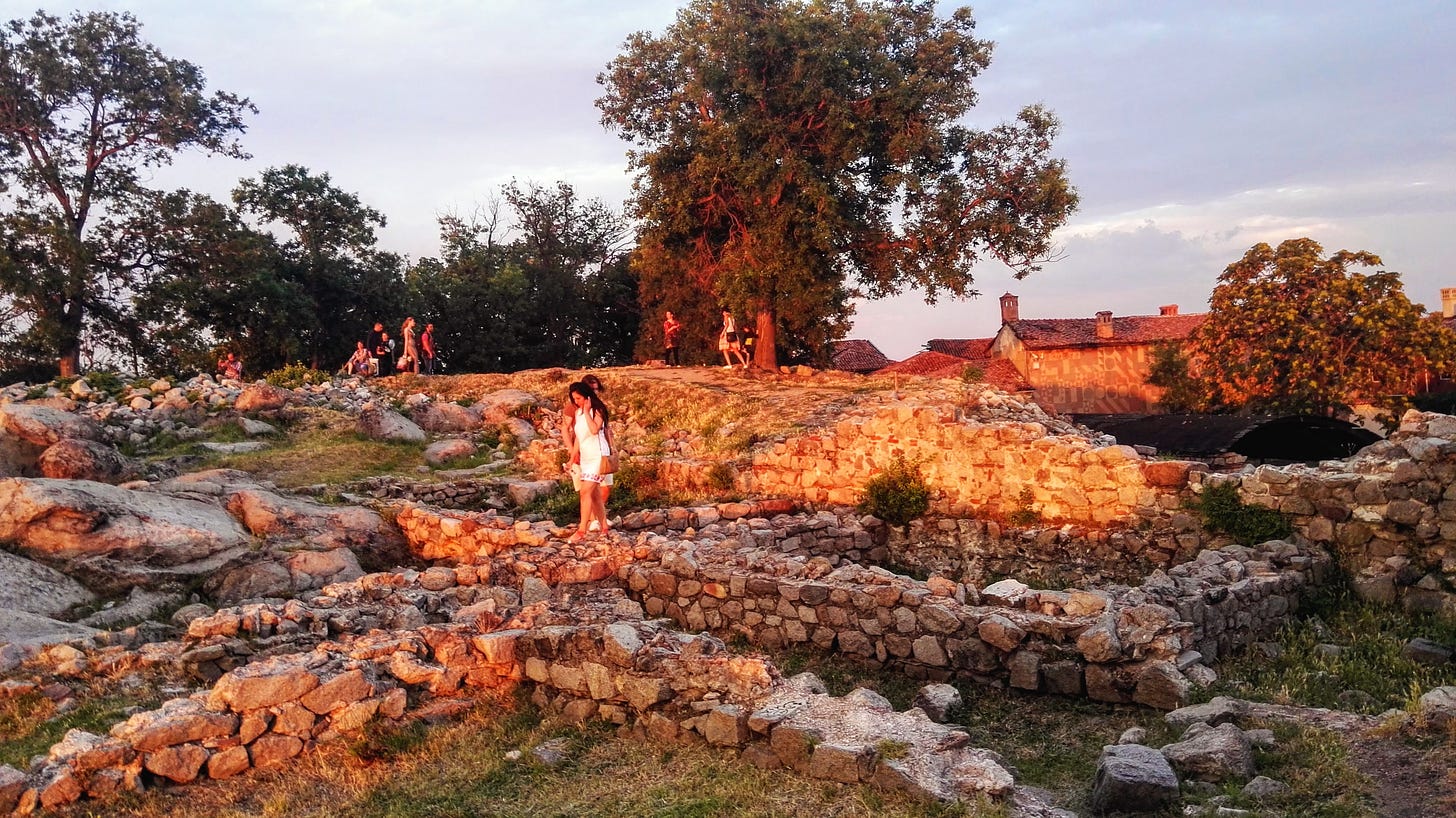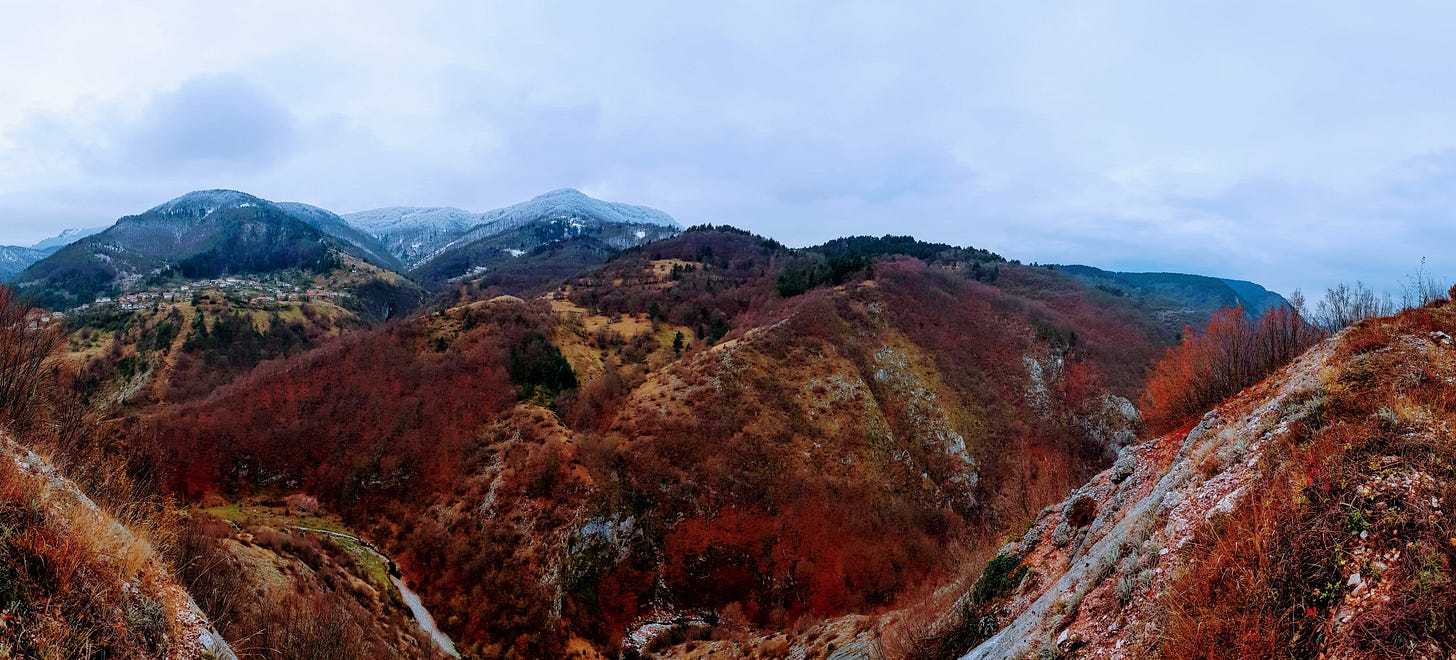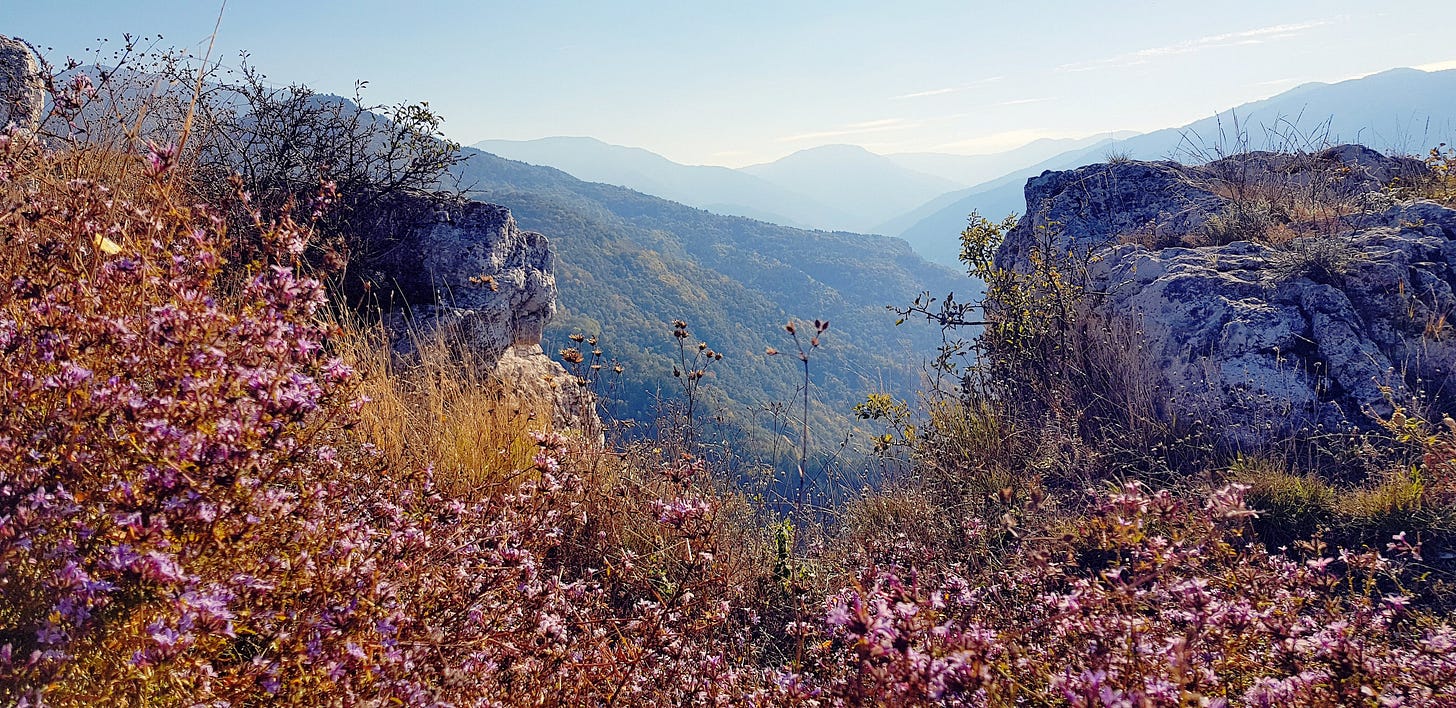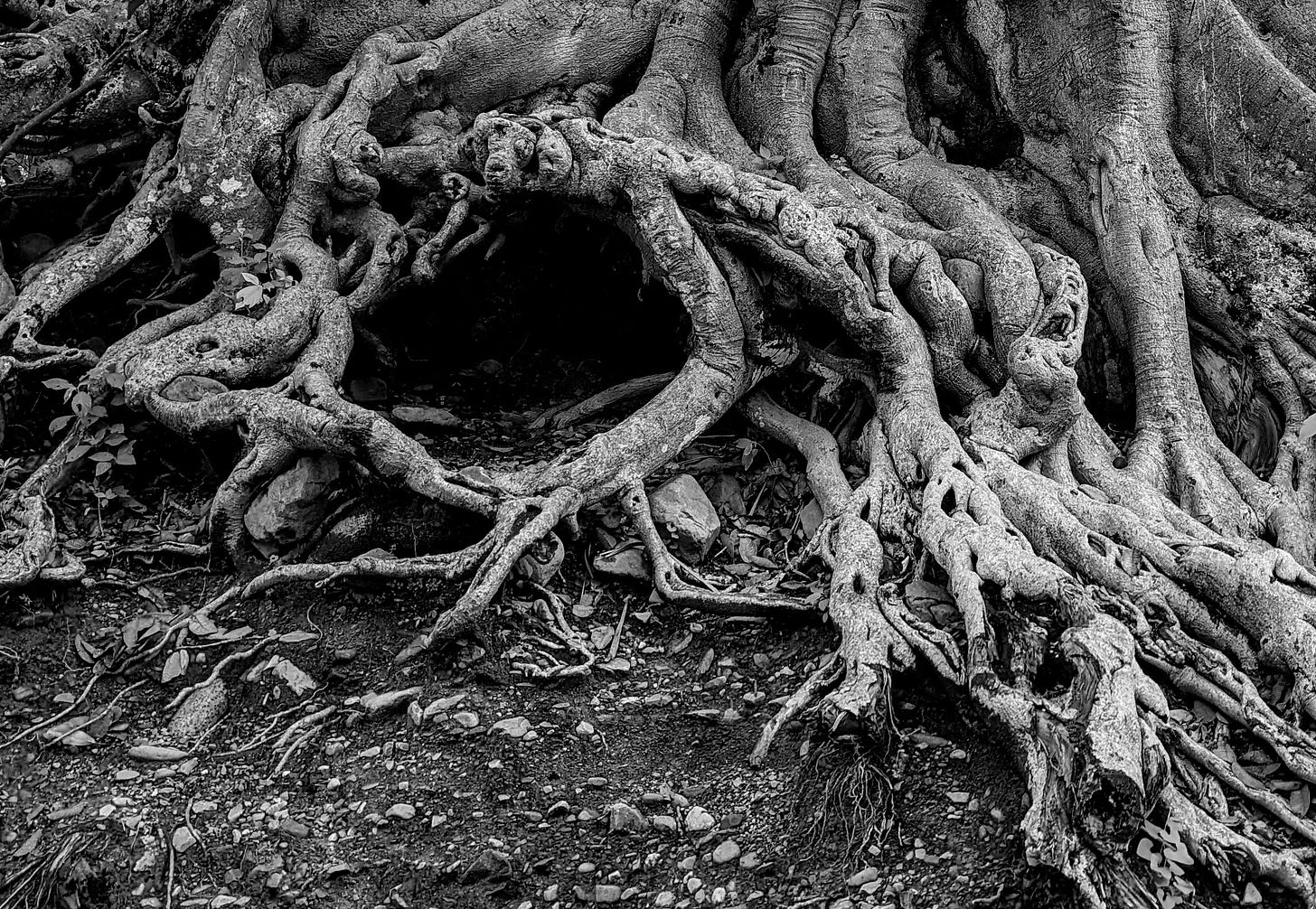On Portals and Ancestral Lineages
Causality is not linear, and reality is stranger than we think
In the Cradle of Life
I’m spending some time in the Andean mountains this winter, and sometimes I look out at the landscape and imagine I’m back in the lands of my Proto-Indo-European ancestors on the other side of the world.
It’s been 3 years since I left Bulgaria. When I left in 2020, it was the end of an era that was marked by some of the most significant events of my life.
The Plovdiv region and the nearby mountains was the place where I then got married to my partner, gave birth to my child, reconnected with my ancestral lineage going back 8,000 years, and went through a series of major spiritual metamorphoses.
When I lived in Bulgaria, I spent a lot of time in the mystical Rhodope mountains, visiting sacred sites and caves where my ancestors lived, locking eyes with centurian trees, and getting talked to by mushrooms. No, not the psychedelic kind - the regular edible kind. They have a way of talking too, if you’re willing to listen. As do the herbs and wild animals. The hunter-gatherer mind is still alive in us.
There is something strangely similar between these two places, the Rhodopes and The Andes. These mountains have sustained human life for a very long time - they are alive with ancient ancestral spirit. Both places are known for the health and longevity of their residents. Cradles of life they are, fountains of youth.
There is a certain indigeneity in the people living in both of these places, something in the way they have been wrecked by modern civilization, yet still manage to be connected to the land. It shows up in their love for foraging wild woods and medicines, their affinity for traditional craft, music and myth, in the certain multigenerational sadness they carry, mixed with a joy for life.
A Strange Attractor in the Rhodopes
The Rhodope mountains stole my heart and gave me back my soul.
Rhodopes were my place of death and rebirth.
One of the many weird things that happened was how I came to be there in the first place. It’s like there was a strange attractor in those mountains, a portal I had to go through. I felt the pull of it more than a decade before. I knew I had to be there, and that it was very significant, but I didn’t know exactly what it was and why.
Here’s the story.
I grew up in Russia, and spent my summers in Bulgaria at my grandmother’s remote mountain house. My mom’s side of the family is Russian, and my dad’s side is Bulgarian and Ukrainian. My extended family in Bulgaria all live in other regions of the country, and I had no special family reason to go to the Rhodopes.
I never actually visited the Rhodope region until I was a young adult, after I had already immigrated to Canada. I came to Plovdiv on my own volition in 2005, as a backpacker, before doing my exchange year at the University of Copenhagen.
I can’t even remember why I decided to visit Plovdiv in particular, it might have been that it’s the oldest living city in all of Europe, and I have been fascinated by ancient history since I was a child. I remember walking the streets of the Plovdiv old city during that visit back in 2005, having a distinct knowing “I am going to live here one day“.
I remember that after this brief first visit to Plovdiv, I kept having vivid dreams of cobblestone villages of the nearby Rhodope mountains - places I didn’t come to actually visit until a decade later. These dreams continued persistently for years.
Exactly 10 years later, I ended up moving to Plovdiv. This was somewhat unplanned. The year was 2015 and at this point, my partner Mike and I had been digital nomads for several years, mostly around Southeast Asia. We then decided to travel around Europe and headed to Portugal. After being there for a couple of months, I got the phonecall that my Bulgarian Baba - my grandma - was on her deathbed. So we immediately booked a ticket to Bulgaria to go see her, and made it there shortly before she passed away.
After that, we decided to visit Plovdiv, which we instantly fell in love with, and moved there for the next 5 years. This period of time was profoundly life-changing, in so many ways both mundane and mysterious.
When we left Bulgaria in 2020, I was not the same person who moved there in 2015.
Not to mention that we arrived as 2 people, and left as 3.
There are certain things in life, that once you see them, you can’t un-see them. Certain shifts in perspective that end up being permanent, for better or for worse.
One such shift for me was the realization that time and causality are not linear like we think they are. Causality works forwards and backwards in spacetime. It’s almost like it’s about how we navigate the fields of propability, how we travel through and weave the probabilistic fabric of spacetime, how we are actually always part of it, and how the energy impulses move through us just as they move through everything else.
You may take that as a metaphor or as metaphysics or dismiss it as nonsense, that’s entirely up to you. I’m not quite sure which one it is myself.
In my experience, the more you try to observe reality directly, as opposed to merely observing stories and concepts, the weirder it gets.
Deep reality is impossible to describe in words.
“The Tao that can be told is not the eternal Tao.” - Laozu, Tao Te Ching
There was a strange attractor in the Rhodope mountains, a portal in spacetime. From a certain perspecitve, you could frame my life as the periods before and after that portal.
At any given time while living in Bulgaria, if you had asked me why I was there, I would have given you a different answer. Everyday stories are like that - they are fickle things.
And yet, there are other kinds of stories that are qualitatively different. They are myths, epics. They go beyond the mundane and attempt to explain the unexplainable, and so they simultaneously read as amazing and improbable.
One such story has to do with a place the name of which literally translates as “portal“.
One time while living in Plovdiv, I took a group of friends on a pilgrimage to a lesser known sacred site in the Rhodope mountains on my birthday. It was November, and the weather was foggy and cold. The trees were standing semi-naked with a few colorful leaves still hanging on, and the rest of the foliage decaying on the ground and filling the air with the distinct aroma of fall.
We settled into our cozy stone guesthouse, built in the traditional Rhodopean style, and after having a hearty meal of patatnik and kebapche, hiked down a steep path into a hidden valley.
From there, we hiked up to a rocky plateau that protrudes in the middle of the valley and has a 360 view on the area below.
This place was considered to be a sacred site by the ancient Proto-Indo-European tribes who inhabited the region as long as 8,000 years ago, and likely before that in deep time.
At the top of the plateau, the solid rock had been hand-carved with many bowl-shaped dents the size of large pots, connected by channels. These are believed to have been used for various rituals by the old tribes.
It is interesting to note that the archeologists don’t know exactly who these tribes were - their relics are too different from those of the Thracians who lived there later and were famously featured in a number of accounts by the Ancient Greeks.
There is a lot of mystery that surrounds these places to this day. Many epic stories are passed down by the local elders, and it is impossible to know where history ends and where myth begins.
Our idea was to hike up to the top of the mountain plateau at sunset and perform a ritual to honor our ancestors at the changing of the seasons.
As we started going up, it suddenly started to snow very heavily. We kept hiking in the dark, trying to light our way with our torches, but the rocks beneath our feet became too slippery, and we could no longer see more than a couple of meters ahead of us. Going up any higher was a bad idea, we decided.
All of a sudden, the group self-organized and built a fire on the side of the mountain. Then we chanted, sang, prayed and danced around the fire, embodying what our ancestors must have done for thousands of years.
At this point the story becomes impossible to tell without using what sounds like hyperbole or mythopoesis.
What happened next is that we opened a portal between past, present, and future. Perhaps whatever compelled our ancestors to choose this place as their ritual ground was still there and was now compelling us to do the same. It was like rediscovering a portal that our ancestors had opened thousands of years ago. And they were all right there, speaking to us in deep time.
My sense of linear time and causality collapsed, and has never been the same since.
It felt like falling through a black hole and being spat out on the other side.
Now I should mention that the name of the nearby village we were staying in is synonimous with the word “portal”. Figure that one out.
I could tell this story many different ways, but non of them would make any more sense than this. Nothing can describe the actual embodied experience.
Words fail in the face of deep mystery.
And yet, this strange and mysterious reality is actually always there, beneath the words and concepts. We just fail to notice it most of the time.
I have come to realize that the way we think and the way use words in modern Western culture actually prevents us from being in touch with the deep mystery.
The Western notion of history, for example, is concerned with verifiable facts and linear progressions - a history that is essentially dead.
This story I am telling here is one that cannot be wrapped up neatly with a little bow. It is not the kind of history that belongs under museum glass. It cannot be pinned down, which makes historians and anthropologists uncomfortable in their chairs.
A lineage is a living history. It lives in my blood and bones, in the old trees, in the ancient rocks that witness the passing of millenia, in the memory of water that touches and permeates everything, and inside all the other brothers and sisters - human and non-human, organic and inorganic - who carry it.
Lineage is a funny word to use here, because it relates to the word linear - but the kind of lineage I am talking about is not linear. It is more like an interconnected web of relationships of aliveness in deep time.
It is something that goes beyong words and concepts. The line between fact and myth is not only blurred, but irrelevant here. What is being pointed to in neither myth nor fact, but something different categorically.
It is the eternal Tao.
As a humanity, we are in a time between worlds.
We too stand in front of a kind of portal.
I recently wrote a piece on the Psychotechnologies for The Age Of Collapse. The piece was called "a great roundup" by someone, and someone else pointed out that Ken Wilber's Integral Practice community also includes those practices. I feel like both these commenters sadly missed the point.
What I was attempting to do was to name certain practices to say "not quite that", and then point to something much deeper and more interesting, something yet unformed that is still (and always) being born at the edges of the unknown, something emergent.
And yet, Western mind likes to fixate on things that are certain and well defined, like a few small pieces of deadwood drifting in the water, while being unaware of the vast, shimmering, living ocean of the unknown that we’re all swimming in.
As Bonnitta Roy often points out, the malware runs deep, and the shift will have to be much more profound than we think.
All images by the author.











Loved your effort to name that nameless experience around the fire. In my own journey I came into certain experiences of depth, predominantly with psychedelics, that provoked my own sense of indigneousness. A quality of being human that felt indigenousness in the here and now, not as a function of ancient ancestors or history. What I like most is this piece hints at more, like a rustling of wind through distant leaves.